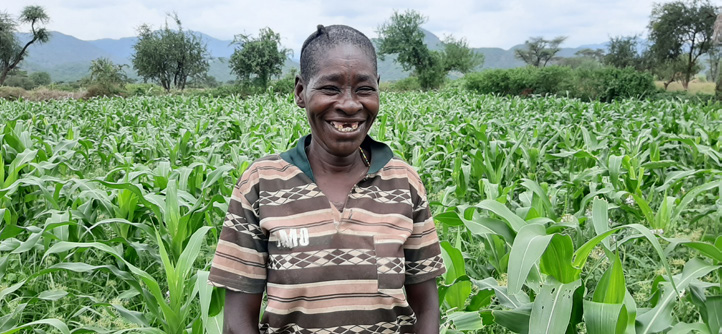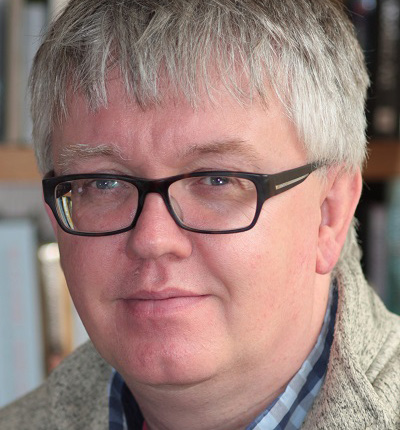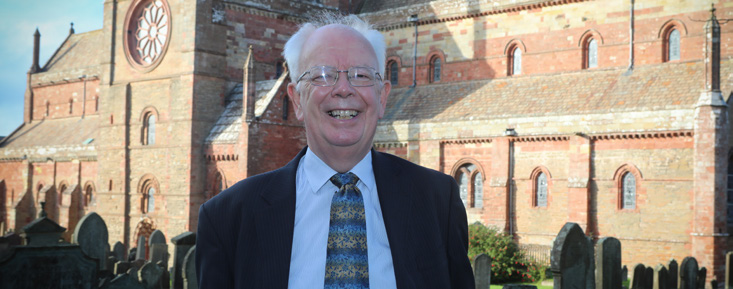NEWS
Call to stand in solidarity with Ethiopia
Leanne Clelland reports on a new resource for churches at Christmas.
A PARTNERSHIP between Christian Aid and the Church of Scotland has led to the creation of a new resource to use in services this Christmas.
By singing, giving, acting and praying together – even though we are apart – churches will stand in solidarity with people in Ethiopia facing the most severe challenges.
It’s unusual to experience a threat here in the UK which is also shared by our global neighbours across all continents. Covid-19 and the measures to curb its spread have held much of the world in its thrall in 2020. It has destroyed lives, instilled fear, devastated livelihoods and forced vulnerable people into more desperate poverty.
Inspired by Jesus, Christian Aid supporters walk alongside those for whom coronavirus is yet another threat on top of existing ones, including the climate crisis, conflict and, in 2020, the impact of locust swarms.
In Ethiopia, people living in poverty are on the frontline of the climate crisis. Locusts are swarming, encouraged by the long droughts and heavy rains. The insects – not seen on this scale in Ethiopia for two decades – have been causing problems in the country since last summer.
Desert locusts eat their own body weight daily. A small swarm eats the same amount of food as 35,000 people in just one day. Almost four million hectares of crops – equivalent to half the size of Scotland – have been eaten by the locust swarms across Ethiopia this year.
Women like Borgodo Tsobe, a widow and mother of five, witnessed plagues of locusts larger than ever before. ‘The locusts suddenly came out of nowhere and ate every green plant in their path. They left us nothing useful,’ she said. Borgodo’s crops were so quickly destroyed that she didn’t know if anything would grow again.

Thanks to the Scottish Government and Christian Aid, Borgodo has planted crops after the locust invasion
Photo
credit: Christian Aid/ Netsanet Feleke
Thanks to the Scottish Government’s Humanitarian Emergency Fund, Christian Aid was able to act quickly to protect any existing crops and plant new seeds for the next harvest. But the extreme weather means that the threat of more locusts remains high.
Meanwhile farmers like Mekonnen dig for water with their bare hands. ‘We pray for rain’, he says. ‘But when there is no rain, we have to dig.’ Friends, fellow herdsmen and children have died through digging so deep that the dry bed collapses above them. Christian Aid is working with families like Mekonnen’s to provide community water sources and explore alternative means of raising income such as through making soap from aloe vera and planting drought resistant crops.
This Christmas, we are reminded that God walks with us through deeply difficult times. God works through us to show love to this world. It is a love that never fails, a love that unites, a love that builds hope.
The Church of Scotland’s Resourcing Worship Team and Christian Aid Scotland staff have developed creative materials for churches to use during Advent. As well as a video conversation between the Moderator the Rt Rev Dr Martin Fair and Sally Foster-Fulton, the resources included details of how to join with supporters across the UK to sing the Christian Aid carol on November 29. ¤
Full details of the Advent Weekly Worship resources are available at: churchofscotland. org.uk/worship/weekly-worship More resources for Christian Aid’s Christmas Appeal can be found at: caid.org.uk/ Christmasworship
NEW HEAD FOR WORK PLACE CHAPLAINCY
Work Place Chaplaincy Scotland (WPCS) has announced a new head as it seeks to minister to the changing landscape of business during the Covid-19 epidemic.
Andrew Gregg has been appointed to lead the national charity, which is 10 years old this year.
Andrew, from Northern Ireland, is the former Edinburgh City Centre workplace chaplain and team leader. He spent 25 years in higher education in Ireland before settling in Inverness, where he co-ordinated the first Daytime Street Pastors initiative, before moving on to WPCS as a volunteer chaplain. He started working full time with WPCS as Training and Vocations Director on a Church of Scotland funded intern project in 2015.
Now as National Director he supports 85 workplace chaplains across the whole of Scotland serving in over 2,000 workplaces.
He said: “The workplace is where many of us spend a significant part of our lives.
We bring our whole selves to work and that includes the things that weigh on us, as well as causes for celebration. The workplace chaplain provides a compassionate, listening presence, being with people going through whatever life turns up. Our chaplains invest their time and skills in providing this independent and impartial care in the workplaces of Scotland, I am delighted to have the opportunity to grow and develop chaplaincy in the workplace in my role as National Director.”
The Moderator of the General Assembly of the Church of Scotland, the Rt Rev Dr Martin Fair, has offered his support to WPCS. He said: “Whilst gathered worship is a central building block of what the Christian life is all about, what Christians do between Monday and Saturday is just as important,” he said.
“That’s when we put what we believe into practice and not least in how we share the care and compassion of Christ. The important thing is this: it’s not enough for us to sit in our buildings waiting for people to come. We’re called to go out, to reach out to where people are, in all the ups and downs of their lives. And this is where Workplace Chaplaincy absolutely excels. I applaud them for it and offer them my support and encouragement for the days ahead.”

Andrew Gregg
For more information on workplace chaplaincy, visit www.wpcscotland.co.uk
CHARITIES PRAISE CARBON COMMITMENT
Christian environmental and development charities have applauded the Church of Scotland’s commitment to work towards becoming a carbon neutral organisation within 10 years.
In a joint statement Christian Aid, Eco-Congregation Scotland and Operation Noah said they ‘joyfully welcome’ the decision taken at the Church’s online October General Assembly, but called on the Church to withdraw its investments from the fossil fuel industries.
The General Assembly passed a motion instructing the Church’s Faith Impact Forum to ‘work with others to develop a strategy for the Church to transition both locally and nationally to net zero carbon emissions by 2030, reporting an outline strategy to the General Assembly of 2021’.
Mary Sweetland, Chair of Eco- Congregation Scotland, said: ‘We are delighted that one of our key partner churches has committed to transitioning to net zero in the next 10 years.’
The issue of the Church’s investment in fossil fuels was debated at the General Assemblies of 2018 and 2019, and would have returned this year if a full assembly had been held as normal in May. Although it was decided there was insufficient time to debate the issue during the weekend’s shortened assembly, it did accept a motion calling for a report to the 2021 gathering on ‘ethical, scientific and theological arguments for and against urgent disinvestment from oil and gas companies’.
Sally Foster-Fulton, Head of Christian Aid Scotland, said: “The communities with which Christian Aid works, in many of the poorest parts of the world, are calling for urgent leadership on climate change, and this decision from the Church of Scotland demonstrates that leadership. We welcome it warmly, and look forward to working in partnership with the Church of Scotland to help realise these ambitious new goals. One of the steps that the Church could take in the short-term is to commit to end its investments in fossil fuel companies.”
James Buchanan, Bright Now Campaign Manager at Operation Noah, said: “It is wonderful news that the Church of Scotland has set a target of reaching net zero emissions by 2030. In order to demonstrate leadership on the climate crisis ahead of the UN climate talks in Glasgow next year, it is vital that the Church of Scotland supports a just and green recovery from Covid-19 by divesting from fossil fuel companies and investing in the clean technologies of the future.”
FORMER DEPUTY FIRST MINISTER NAMED MODERATOR-DESIGNATE
The former Deputy First Minister of Scotland, Lord Wallace of Tankerness has been announced as Moderator-Designate of the General Assembly of the Church of Scotland for 2021.
The 66-year-old life peer from Orkney, an elder of St Magnus Cathedral in Kirkwall, said he was ‘humbled and honoured’ by the appointment.
“I am both excited and daunted about the challenge of the task that lies ahead and to be honest I have had to pinch myself that this is actually happening,” he added.
Lord Wallace’s late father John was an elder at Annan Old Parish Church in Dumfries and Galloway for 64 years. In his youth, the Moderator Designate was a member of the Boys’ Brigade, involved with Scripture Union and was confirmed in the faith while a law student at Cambridge University in 1973.
Ordained as an elder in St Bernard’s Church in Stockbridge, Edinburgh in 1981, he has been a member of the Session at St Magnus since 1990.
He said that his faith ‘drove’ him into politics: “I went into politics to make a positive difference to society and my motivation is grounded in my Christian faith.”

Lord Wallace of Tankerness
He was an MP for the Liberal Party and then the Liberal Democrats from 1983-2001, and an MSP from 1999-2007. As leader of the Scottish Liberal Democrats, he was deputy first minister of Scotland in the first term of the new devolved government. He was appointed to the House of Lords after leaving the Scottish Parliament, and led the Liberal Democrat group from 2013-16.
He is married to Rosie, with whom he has two grown-up daughters, Helen and Clare.
Lord Wallace will become only the second church elder in modern times to hold the role of Moderator, after Dr Alison Elliot in 2004. He said that he hoped his year as Moderator would be an encouragement to elders and other church members.
“We are living in a time when we will probably be called on even more than ever, given the decreasing number of ministers in charges and the challenges that lie ahead as we slowly emerge from the coronavirus pandemic.
“I hope to help encourage elders and congregation members that they have an important role to perform which will be valued.”
CROSSREACH ONLINE COUNSELLING PARTNERSHIP
A partnership between CrossReach and volunteers from the Scottish Tech Army will make it easier for people in need of support to sign up for vital counselling services.
In response to an increase in demand for counselling during the coronavirus pandemic, CrossReach teamed up with the innovative technology group to create a new online referral and assessment system.
In 10 weeks the partners created a secure and confidential system, which will make it quicker and simpler for people to gain access to counselling when launched later this year.
Jackie Walker, head of service for counselling at CrossReach, said: “I’m delighted that the Scottish Tech Army chose to work with us to help realise a project that we could not complete alone.
“Their skills and experience have helped us to review our existing service provision, and their system will make it easier for those in need of support to contact our counselling services and for us to respond.”
A link on the CrossReach website will take those seeking help to a site where they will be able to refer themselves, family members or people in their care to counselling services.
The new referral site will also allow information about each person to be stored securely and simplify how donations can be made.
The Scottish Tech Army is made up of 900 volunteers from the tech industry who are working to support organisations dealing with the immediate health, social and economic impacts of the coronavirus crisis.